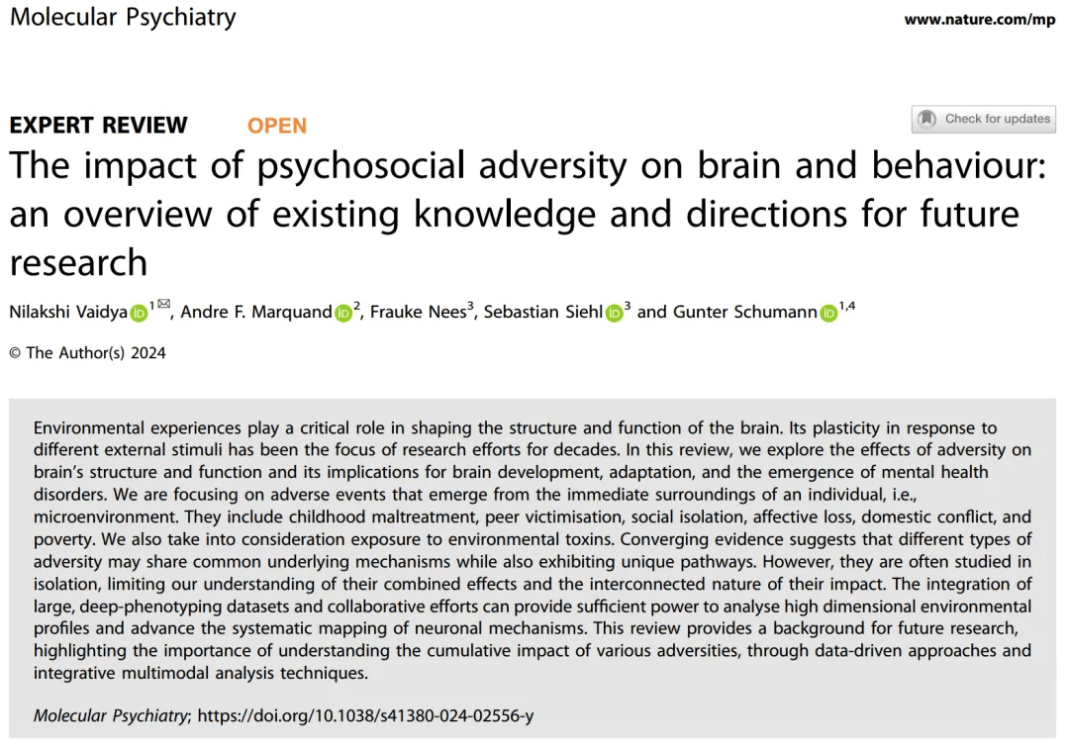An old saying goes, “One must endure hardship to become a better person,” which suggests that through the baptism of setbacks and difficulties, various aspects of a person will be trained, allowing them to surpass others. However, with the significant improvement in living conditions, we seldom face the material scarcity and life hardships that our ancestors did. As a result, some parents believe that the new generation’s growth environment is too “comfortable” and that a little “hardship” needs to be artificially created to temper their children.
But is the “hardship” education really useful?
Recently, an article published in the journal Molecular Psychiatry, a subsidiary of Nature, pointed out that enduring hardship, especially in early years, has various detrimental effects on brain development and personal behavior.
DOI: 10.1038/s41380-024-02556-y
The Plasticity and Stress Load of the Human Brain
The brain has plasticity. When faced with adversity (including various difficulties and harsh natural environments), a person’s neurological, metabolic, and other physiological regulation systems will produce various physiological responses to adapt to adversity.
If a person faces adversity for a long time or repeatedly, these physiological responses will gradually accumulate, forming a “stress load,” which can significantly lead to mental and physical illnesses.
Different Adversities
Specific Effects on the Brain
To understand the effects of adversity on the brain, the study collected literature data from January 1, 2010, to April 8, 2023, through searches on PubMed, focusing particularly on samples from the general population to comprehensively understand the changes in brain structure and function after experiencing adverse life events, analyzing the impacts of abuse, institutional care, bullying, loneliness, poverty, family conflicts, and environmental pollution as forms of “adversity.”
1
Abuse
Abusive behavior towards children is undoubtedly a shameful crime. In addition to physical harm, children’s brain development and psychological growth can also suffer severe negative impacts.
The research found that abuse and neglect of children can lead to decreased volumes of the amygdala, prefrontal cortex, hippocampus, and dorsolateral prefrontal cortex, and affect pituitary development. These brain structures are closely related to cognitive, emotional, behavioral regulation, and memory functions. Thus, abusive behavior towards children can affect their cognitive and emotional abilities.
In addition to abused children, the study also observed that adults who had experienced emotional abuse in childhood tend to have smaller gray matter volumes in the ventral striatum and show insensitivity to reward responses. While these changes are thought to be more advantageous for survival under difficult conditions, they also hinder exploratory behavior.
2
Institutional Care
Investigations into care institutions found that children raised in these environments often lack others’ attention and have relatively fewer opportunities for cognitive and social development. These children exhibit smaller brain gray matter volumes, thinner cortical thickness, and abnormalities in executive functions (including planning, organizing, problem-solving, and emotional regulation) and brain reward mechanisms.
The above impacts are related to the age at which adoptions occur.


